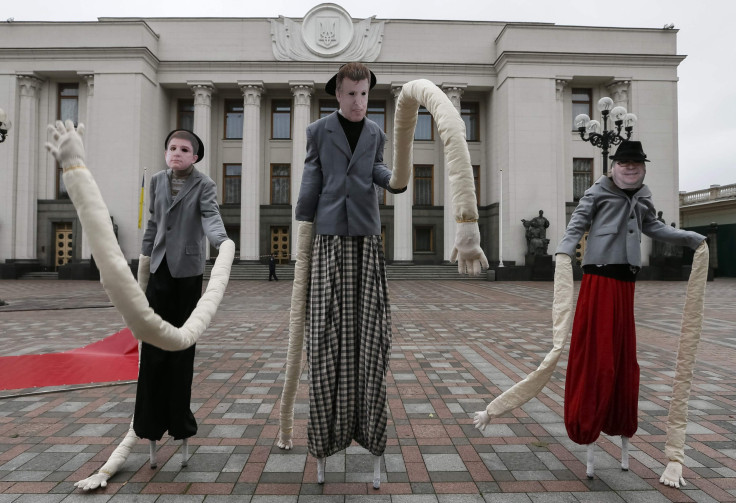Ukraine Goes To The Polls Amid Right-Wing Threat Of A Second Revolution

KIEV, Ukraine -- Ukraine is set to vote on a historical parliamentary election on Sunday, the first after a bloody revolution that ousted pro-Russian president Viktor Yanukovych in February. President Petro Poroshenko’s pro-Western party is leading comfortably in the polls, but it may still fall short of an absolute majority in the Rada, Ukraine’s parliament, and have to form a coalition.
But the problem is that moderates to choose from may be in short supply, as a growing number of Ukrainians express anger at endemic corruption and extreme-right parties occupy an increasingly visible political space.
Transparency International, an anti-corruption watchdog based in Berlin, gave Ukraine a score of 25 out of 100 on a corruption perceptions index last year, and it ranked it 144th out of 177 countries, behind Nigeria and Iran. Corruption hasn't disappeared with the ouster of Yanukovych, whose downfall highlighted a vast web of illegal practices that the Euromaidan revolution has so far failed to end.
That’s leading to violent reactions such as the “trash bucket challenge.” Angry mobs, often organized by the far-right party Right Sector, grab allegedly corrupt officials and throw them into garbage, sometimes holding them down while refuse or paint is thrown at them.
In late September, a member of Yanukovich’s party was beaten while campaigning for the election in the southern city of Odessa. Some of the men attacking him were wearing Right Sector armbands.
“People in the country had enough of this situation and we’re just doing what people want,” Yuri Mindiuk, a Right Sector candidate, said in his office in Kiev. The group waited for the government to fulfill the goals of the revolution, especially in dealing with corruption, but nothing has changed.
“We are worrying … that we are going to [a] situation with the restoration of [the] old Yanukovich system with new faces,” he said.
The sense of a lack of change felt by the Right Sector is shared by many in Ukraine, including by more moderate voters.
Even Justice Minister Pavlo Petrenko admitted the trash bucket challenge has roots in genuine discontent: “I can’t say this is a good phenomenon … but this is a phenomenon that is a request of the society at the moment,” he said.
Tetiana Shevchuk protested at Independence Square in Kiev from day one of the demonstrations that ousted Yanukovych. She now works with an anti-corruption nongovernmental organization, and says there's no political will for real reform, and there hasn't been punishment for those who committed crimes during the Yanukovich era.
The government has made attempts to fight corruption, such as by creating an anti-corruption office to tackle the problem.
“We hear their words but we don’t see results,” Shevchuk said of the government. She believes the government is using the worsening economy and the war in the east -- in which Russian-supported separatists have proclaimed an independent “Donetsk People’s Republic” and are fighting the Ukrainian army -- as an excuse for why the pace of change has been slow.
One significant problem the government of Prime Minister Arsenyi Yatenyuk cites is that Yanukovich’s allies are still sitting in parliament and can block what they think is unfavorable legislation.
A so-called “lustration law” was passed earlier this month in an attempt to purge the political system of officials deemed corrupt or linked to Yanukovich’s government. However, this is a complicated endeavor involving the investigation of hundreds of thousands of people, while the country is going through a period of transition with fragile institutions. It also faces legal hurdles that may limit its effectiveness at cleansing out, or “lustrating,” corrupt officials.
Dmytro Boyarchuk, the Ukrainian director for the think tank Centre for Social and Economic Research, isn't optimistic: “There are good steps, but (corruption) will not disappear in a year, five years or I would say in 10 years,” he said.
This month, a protest outside parliament in Kiev turned violent with dozens arrested, and members of Right Sector and the Azov Battalion, a far-right volunteer militia that has fought rebels in the east, marched in downtown Kiev throwing smoke bombs and causing chaos.
Such vigilantism has raised fears of individuals circumventing the justice system to hand out punishment.
If politicians ignore such signals, as Yanukovych did, then another revolution could happen, the Centre for Social and Economic Research’s Boyarchuk said.
But the violence lurking in Ukrainian politics is already affecting the climate. “This cult of violent [protest] is dangerous and this atmosphere of intimidation around the parliament is not … conducive to democratic discourse and deliberation,” Adrian Karatnycky, who specializes in Ukrainian affairs at the Atlantic Council think tank, said.
Whether government institutions are strong and organized enough to bring order and punish violent political offenders remains in question.
There is a widespread lack of confidence in law enforcement in Ukraine, where many police officers are suspected of taking bribes, leading some to feel that only groups like the Right Sector can be trusted to clean house.
“I’m afraid of a second revolution because it would be violent from the very [first] moment,” Shevchuk, the Kiev protester , said.
For the Right Sector’s Mindiuk, that revolution is a distinct possibility. “If nothing’s changed, I think [there] can be a second or third [revolution],” he said. “We’re more ready than November last year.”
© Copyright IBTimes 2024. All rights reserved.





















